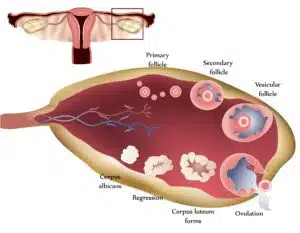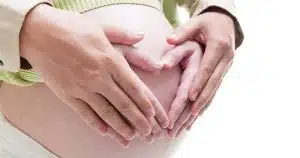So many women with PCOS are first diagnosed when they struggle to conceive. You see, in this day and age, we tend to use the birth control pill as a form of contraception. The thing is that it also masks our PCOS symptoms until we stop taking the pill to start a family. Once we’re diagnosed, we’re left asking the questions, “How do I get pregnant with PCOS?”
This is very much my own experience as well. I had a sneaky suspicion that I would struggle to get pregnant, based on my history of a very erratic cycle (prior to starting the pill). And when I went off the pill, my period just never returned. Makes starting a family pretty tricky!
So off I went to the doctor where I was formally diagnosed with PCOS. Getting the diagnosis was a relief in some ways. At least we knew what we were dealing with. It was also heart breaking. What did that mean for our chances of starting a family?
I’m going to answer that question and more in this article.
But before we get into that, if you are reading this and you are trying to conceive with PCOS, I want to let you know that while the journey to motherhood may be shorter and less complicated if you don’t have PCOS, it is totally possible to conceive with PCOS!
So, there is hope!
Let’s have a look at what PCOS is, how it affects our fertility, and most importantly, what we can do to boost our fertility with PCOS.
What is PCOS?
PCOS is fundamentally an endocrine disorder. What this means is that there is something wrong with our hormones. Researchers are not 100% what causes PCOS but it seems that there is a hereditary component.
What are the symptoms of PCOS?
Now, if you have PCOS, I’m sure you’re all too familiar with the symptoms! But let’s just recap them anyway:
- Irregular menstrual cycle (which makes getting pregnant more tricky)
- Acne
- Hirsutism (hair where you don’t want it)
- Tendency to gain weight and difficulty losing weight
- Cysts on the ovaries (sometimes)
- Alopecia (male pattern baldness)
- Infertility (which is exactly what we’ll talk more about in this article)
How is PCOS diagnosed?
PCOS is often diagnosed using the Rotterdam criteria. Now, the Rotterdam criteria states that in order to be diagnosed with PCOS, you need to present with 2 out of 3 of the following:
- An irregular menstrual cycle
- Cysts on your ovaries
- Signs of high testosterone levels
That’s important because you could have a regular cycle but if you have signs of high testosterone and cysts on your ovaries, you’d be classified as having PCOS.
Normally, blood tests are done and a possible ultrasound to assess whether there are ovarian cysts.
How does PCOS affect fertility?

Insulin is very often at the root of the problem. You see, our pancreas tends to produce too much insulin. So, we have extra insulin circulating but that insulin also causes our over sensitive ovaries to produce too much testosterone.
It’s this excess testosterone that plays havoc with the development of the eggs from the ovary and ultimately inhibits ovulation (1).
But, the good news is that there are things that you can do to better manage those insulin and testosterone levels and we’re going to talk more about that in a little while.
For now, though, let’s answer some more pretty important questions with regards to conceiving with PCOS.
Can I conceive with PCOS?
Now, this may seem like an odd question but when I was trying to conceive, it was an important question for me. You see, there seems to be a lot of myths and misconceptions when it comes to PCOS.
I have had girls as young as 14 telling me that their doctor told them they will never have children because of their PCOS. And that is categorically untrue. The fact is, a diagnosis of PCOS does NOT mean that you will never have children.

Of the 91 women with PCOS, 86.7% of them had at least 1 child and 73.6% of them had gotten pregnant without any fertility treatments. Also, they tended to have a higher ovarian reserve. This means that they were able to get pregnant at an older age than women without PCOS (2).
Now, why am I telling you this? Because if you are struggling with fertility and struggling to get pregnant, I want you to know that there is hope. Your journey may be a little longer than someone without PCOS but it really is possible.
How can I boost my fertility with PCOS?
Remember when we spoke about why PCOS makes us struggle with getting pregnant? I told you that there are some things that you can do to balance your testosterone and insulin levels. Well, let’s have a look at some of the things that you can do.
Lose Weight
Yes, I know. This may not be the first time that you have heard this. And I know that losing weight with PCOS is easier said than done!
Okay, let’s talk about this. Not all women with PCOS struggle with weight but many many do. It is often one of the very frustrating symptoms of PCOS and tends to go hand in hand with PCOS.
There was recently some research done on weight loss, PCOS and pregnancy. 187 overweight women with PCOS were treated with Clomid. Another study involved 142 overweight women with PCOS who worked on losing weight before starting Clomid.
Here are the results: Of the 187 women who didn’t lose weight first, only 44% of them ovulated and 10% went on to have a baby. In those women who did lose weight before starting fertility treatments, 62% of the ovulated and 25% had babies (3).
The research is pretty clear that women who are overweight with PCOS would benefit from losing weight before trying to conceive.
Now, all is not lost. I have heard from so many women that their doctor told them to lose weight but didn’t tell them HOW. Well, I have spent many hours doing research and teaching this very thing. I have put it all together in the PCOS Weight Loss Execution Plan, which you can find here.
Exercise

That is pretty huge if you ask me! And here is the thing: going for a brisk 45 minute walk 3 times per week seems manageable and less intimidating than going to the gym, for example.
So, I really want to encourage you to get moving, especially if you are trying to conceive with PCOS.
Eat well to manage your hormones
When I was trying to conceive, I was incredibly frustrated by my doctor’s lack of knowledge about PCOS. I really felt brushed aside and was desperate to become a mom.
This drove me to research as much as I possibly could about PCOS and what it actually meant for me. (I share a lot of my research and story in my PCOS to Pregnant Starter Kit, which you can find here).
One of the first things that I did was drastically change my diet. I wanted to manage my insulin to help lower my testosterone and boost Sex Hormone Binding Globulin. I gave up dairy (you can find out why here), Gluten (read more here) and I focused on foods with a low Glycemic Load.
Four months later, I got my positive pregnancy test.
Now, I know that this may not be the case for every single woman reading this article. But I do want to assure that the research is clear that dietary changes are first line in PCOS treatment and will help to manage your hormones, boost ovulation and improve your chances of getting pregnant.
Supplements
Vitamin D
Vitamin D, or the “Sunshine Vitamin” plays many crucial roles in our bodies. A Vitamin D receptor is found in the uterus and ovaries and it is thought to play an important role in the development of the uterine lining.
Research also shows that women with higher levels of Vitamin D have a four fold chance of conceiving from IVF, compared to women with lower Vitamin D levels (4).
But here’s the crucial bit: 85% of women with PCOS are deficient in Vitamin D. So, if you aren’t already taking a Vitamin D supplement, I really would suggest that you do! (5)
Inositol
The role of Inositol in women with PCOS is well researched and documented. There are also wonderful benefits of using Inositol when trying to conceive with PCOS (6)
- Myo-inositol restores normal ovulatory activity and fertility in women with PCOS
- Myo-inositol improves egg quality and pregnancy rate in women with failed IVF
- Inositol improved pregnancy rate and lowered cancellation rate in PCOS infertility patients
- D-chiro-inositol lowers free testosterone by 55% and resumes ovulation in 86% of PCOS women
My favourite Inositol supplement is Ovasitol, which is a combination of Myo-inositol and D-chiro-Inositol. You can find out more about Ovasitol here.
There is Hope
If you are trying to conceive with PCOS, I want to assure you that there is hope! I have two beautiful children, both of whom I have conceived naturally.
But I am not the only one.
Here are some brief stories of other women who have managed to conceive with PCOS. All of them have followed the guidelines laid out in this article.
[dt_quote type=”blockquote” font_size=”big” animation=”none” background=”pink”]
“I can’t believe this! Tarryn You and your work are a blessing! After just nine weeks of following Your instructions I’m pregnant! After so many years of trying without any luck! So thank You for doing this! ❤”
[/dt_quote]
[dt_quote type=”blockquote” font_size=”big” animation=”none” background=”plain”]After a year of TTC and being diagnosed with PCOS six months ago, I just found out that I am pregnant! :)[/dt_quote]
[dt_quote type=”blockquote” font_size=”big” animation=”none” background=”plain”]I found out I was pregnant a week ago! I have been nervous due to my miscarriage back in January, but I have had three blood draws and they all came back good, so things are so far on track.
We did some fertility treatments last year and this year that failed (and the one that ended in a miscarriage). We took a break and I started the diet and continued with acupuncture. I am telling you, the diet works! I know it was the key to helping me. Just wanted to share![/dt_quote]
This article really is just the very tip of the iceberg of any kind of discussion on getting pregnant with PCOS. There is so much more to talk about and learn. So, if you want to carry on the conversation and learn all about getting pregnant with PCOS, why don’t you check out my PCOS and Fertility Program? Or the PCOS to Pregnant Starter Kit is a great place to start.
If you have any questions or want to share your story about becoming a mom with PCOS, please leave me a comment below!
- sustainable pcos weight loss strategies
- Over 5500 women have done it and seen results
- [bonus] Done for you pcos meal plans
- [bonus] intermittent fasting for pcos course
- [BONUS] personalised nutrition plan
JOIN OVER 5,500 OTHERS







